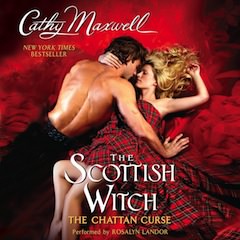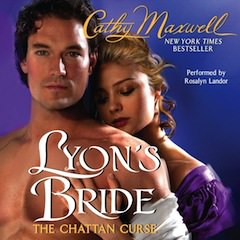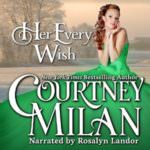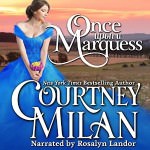Lyon’s Bride and The Scottish Witch are Books One and Two respectively in Cathy Maxwell’s Chattan Curse trilogy which tells the stories of three siblings – Neal, Harry, and Margaret Chattan – whose family was put under a powerful curse almost two hundred years previously.
Each book (including Book Three, The Devil’s Heart) opens with a prologue telling the story of the curse from a different viewpoint. We learn how, in 1632, a young Scottish girl was cruelly jilted by her lover, Charles Chattan, and killed herself as a result. Over the girl’s funeral pyre, her mother, the witch Fenella Macnachtan, curses Chattan and all his decendants before consigning herself to the flames.
“When a Chattan male falls in love,
strike his heart with fire from Above.
Crush his heart, destroy his line;
Only then will justice be mine.”
Skipping forward to 1814, in Lyon’s Bride we meet Mrs. Thea Martin, a widow and mother of two boys who, although a duke’s daughter, was ostracised from her family when she eloped with a man of whom they did not approve. In straightened circumstances, she manages to make a living as a matchmaker and has earned herself a name for being able to find even the most difficult clients a suitable husband or wife.
Thea is by nature independent and somewhat stubborn, but she loves her two sons fiercely and, having been unhappy in her marriage, has concentrated all her efforts on their happiness, believing her time for romance has passed. Even though she arranges matches for a living and continues to believe in love, she is convinced it is not for her and has erected barriers around her heart to protect herself from feeling deeply and being hurt again.
Her most recent success in finding a wife for a very unlikely gentleman leads to her being offered an even more unusual commission. Neal Chattan, Lord Lyon, needs a bride, but his requirements are very specific – he wants a wife he can never love.
Thea is appalled. And it’s not just because the idea of making such a match goes against her principles; she and Lyon spent an idyllic summer together when they were in their teens, and knowing he’s a kind, decent man, Thea believes he deserves better. But he is adamant. He wants a family and children he can love (his own childhood having been, for reasons we discover later, rather empty and loveless) but because of the curse, doesn’t want to marry a woman with whom he might fall in love. He believes that if he can marry without it, he might have a chance of breaking the spell and his children will be able to live unencumbered.
Thea is naturally, and understandably, dismissive of the curse and at first refuses to undertake the commission. But circumstances conspire to make her acceptance a necessity and she reverses her decision, hoping that perhaps she will be able to turn Neal from his seeming desire for a miserable marriage.
It quickly becomes apparent that Neal and Thea share a deep and intimate connection, something which they both fight for different reasons. Her marriage to an unstable man has left her unwilling to trust any man with her heart again. And Neal, determined on making a loveless match and knowing how close he had come to falling in love all those years ago, knows he cannot afford to fall now and ruin his plans for breaking the curse. While there were a couple of plot points I took issue with, I liked the direction of the story overall, as Neal goes from fearing love to embracing it, deciding to live his life rather than live in fear.
Lyon’s Bride also sets the scene for the events of the next two books in the trilogy, as we are introduced to Harry and Margaret. Both are desperate to stop Neal from pursuing his plan and want to keep to the pact they all made years ago – that none of them would marry and have children, meaning the curse would die with them. But their pleas cannot shake Neal’s desire for a family of his own and his belief that he may have found a way to circumvent the curse.
This is actually a shorter than average audio at around eight hours listening, but it works well as an introduction to the trilogy. I liked the “second chance” romance between Neal and Thea, and the way in which Ms. Maxwell gave real depth to their relationship. I could certainly believe that they shared a connection at a deep emotional level.
On the whole, the characterisation was very good throughout, although I felt that Thea was more clearly defined than Neal who, while being kind and charming, was a little bland. That said though, Rosalyn Landor did a good job with her characterisation of him, putting a warmth and humour into his voice that added to his attractiveness and gave him a vibrancy I didn’t feel was always there on the page. She also did a good job distinguishing Neal from Harry by giving Harry’s voice a more clipped quality and a harsher edge which made it sound darker than Neal’s generally softer tones.
Thea’s two young sons, Jonathan and Christopher, are well fleshed-out, too, real characters in their own right rather than convenient cyphers to show us how good a mother Thea is or what a great father Neal is going to make. They’re inquisitive, charming young lads, and I especially liked the way that Jonathan (the eldest) is beginning to regard it as his duty to protect his mother. Ms. Landor is able to voice children appropriately and convincingly without making them sound too high-pitched or squeaky. She also makes the boys sound quite distinct, so there is never any question as to which of them is speaking.
 Unusually for series books, Lyon’s Bride and The Scottish Witch have cliffhanger endings, so if one wants to find out what happens to Neal and Thea, it’s necessary to listen to Harry’s story in the next book. However, I don’t think it’s absolutely necessary to have heard Lyon’s Bride before embarking upon The Scottish Witch, as there’s enough information given in the latter to enable the listener to work out what’s going on.
Unusually for series books, Lyon’s Bride and The Scottish Witch have cliffhanger endings, so if one wants to find out what happens to Neal and Thea, it’s necessary to listen to Harry’s story in the next book. However, I don’t think it’s absolutely necessary to have heard Lyon’s Bride before embarking upon The Scottish Witch, as there’s enough information given in the latter to enable the listener to work out what’s going on.
At the end of Lyon’s Bride, Harry Chattan, a somewhat cynical and bitter former Cavalry officer, had some serious thinking to do and obstacles to overcome. By the time we meet him again, he’s firmly back-in-the-saddle, so to speak, and hunting desperately for a way to break the curse and restore his brother to health. His search takes him to Glenfinnan in Scotland, where he rather foolishly announces that he’s looking for a witch and offers a substantial financial reward to any who can help him. One of those who decides to do so is Portia Maclean who arranges to meet him under cover of darkness and induces him to believe that she is Fenella Macnachtan.
Not only is Portia not Fenella, she’s not a witch either. She, her younger sister, Minnie, and their mother have had to leave London in order to live more cheaply at Camber Hall, a somewhat neglected property belonging to the Duke of Moncrieffe. Portia’s sister is the beauty of the family while their mother is one of those so-called invalid mamas so often found in historical romances. Lady Maclean either cannot or will not bring herself to take an interest in the running of their household so naturally, all the decisions and worries fall to Portia who, while being quite capable, would nonetheless appreciate some help occasionally, even if that help came in the form of her mother’s being willing to economise and not be so concerned with keeping up appearances. Portia longs for more, for a life of her own – even as she knows she’s doomed to be the spinster daughter, firmly on the shelf and destined to be her mother’s support (and unpaid servant) for the rest of her days.
Harry is a man with much in his past about which he is not proud. His army service was brutal and bloody and I thought the author handled that aspect of his character well. She made it clear that he had issues with the things he’d seen and done and that they led him to believe himself to be less deserving than his brother – but she didn’t continually hit us over the head with it.
While Harry and Portia’s first meeting is somewhat inauspicious, she soon begins to feel respect, and more, for this strong, proud man who is so desperate to save his brother that he will get on his knees and offer his own life in exchange for Neal’s. Not that she believes in the curse – far from it, but she believes in Harry’s conviction and soon decides to help him to try to find a way to help Neal.
The romance between them begins to grow at a sensible pace and I enjoyed the way the author developed their growing awareness and attraction. But then suddenly (and, it would seem, with some supernatural intervention as things escalated so quickly as to make me wonder if I’d missed a couple of chapters), Harry and Portia begin a clandestine affair.
It seemed out of character for both of them. I think it’s supposed to feel that way, given what I’ve said about the fact they appear to have been given a magical push in that direction (not that they needed much pushing) but I did find it rather jarring.
Before long, Portia realises that she has fallen head-over-heels in love with Harry and, finally accepting the reality of the curse, realises that he can’t afford to fall for her, so she attempts to break things off with him. Being a man and thus somewhat dim (!), it takes him a while to work out why she has spurned him, even when the local witch more or less spells it out for him.
But once Harry does realise the truth, he – like Neal – admits to the importance of love in his life and instead of shutting himself away to mope, wants to spend whatever time he has with the woman he loves.
So now, it’s all up to Margaret, their somewhat sharp-tongued, waspish sister, to do what she can to break the curse in the final book, The Devil’s Heart.
Ms. Landor once again brings her considerable range and interpretative skill to this audiobook. The female roles are especially well done, with Portia and Minnie both voiced in ways which are well suited to their respective ages and dispositions. She gives Lady Maclean a rather bored-sounding drawl at the start of the story that expertly conveys her weariness and disinterest in those around her. Where Harry often sounded curt and abrasive in the previous book, here, Ms Landor has effected a slight softening in tone, which definitely helps to show how much he’s changed from the harsh, self-centred man he had been and has become a man who is prepared to do absolutely anything for the people he loves.
The secondary characters are so distinctly defined as to be immediately identifiable, and Ms. Landor does a very good job with the various Scottish accents she uses to portray the villagers. There is also the added challenge of voicing Rowan, Harry’s Indian servant, which she does well, and without resorting to caricature.
I enjoyed listening to these stories, although as I’ve said, I did have reservations about certain events which took place in both. But even so, they were very entertaining and beautifully told and the central couple in each book was likeable and well rounded. I definitely plan to listen to the final story in the trilogy in the near future.
Caz
Narration: A
Book Content: Lyon’s Bride – B The Scottish Witch – B-
Steam Factor: Glad I had my earbuds in
Violence: None
Genre: Historical Romance
Publisher: Harper Audio
The Scottish Witch were provided to AudioGals for review by Harper Audio.





2 thoughts on “A Cathy Maxwell Double Review – Lyon’s Bride and The Scottish Witch”
Comments are closed.